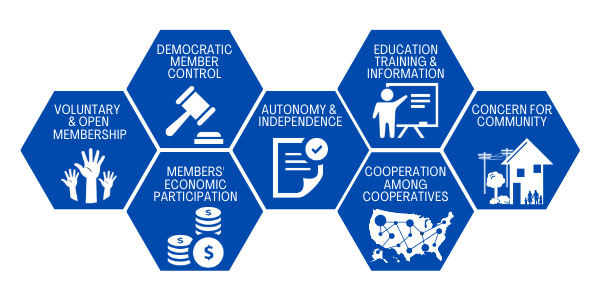Cooperative Principles
The principles that electric cooperatives follow today arose from an early consumer cooperative called the Rochdale Society of Equitable Pioneers. Founded in 1844, this cooperative was one of the first to pay a patronage dividend, forming the basis for the modern cooperative movement. The Rochdale Pioneers also designed the Rochdale Principles, a set of principles of cooperation that provided the foundation for the principles on which co-ops around the world operate to this day. These core principles and values are a key reason that America’s electric cooperatives operate differently from other electric utilities, putting the needs of their members first.
Cooperative Principles
- Voluntary and Open Membership — Cooperatives are voluntary organizations, open to all persons able to use their services and willing to accept the responsibilities of membership, without gender, social, racial, political or religious discrimination.
- Democratic Member Control — We’re governed by our members. Cooperatives are democratic organizations controlled by their members, who actively participate in setting policies and making decisions. The elected representatives are accountable to the membership. In primary cooperatives, members have equal voting rights (one member, one vote) and cooperatives at other levels are organized in a democratic manner. (It doesn’t depend on your energy usage or your tenure with us.)
- Members' Economic Participation — Members contribute equitably to, and democratically control, the capital of their cooperative.
- Autonomy and Independence — Cooperatives are autonomous, self-help organizations controlled by their members. If they enter into agreements with other organizations, including governments, or raise capital from external sources, they do so on terms that ensure democratic control by their members and maintain their cooperative autonomy.
- Education, Training, and Information — Cooperatives provide education and training for their members, elected representatives, managers and employees so they can contribute effectively to the development of their cooperatives.
- Cooperation Among Cooperatives — We serve our members best by strengthening the cooperative movement and working together through structured groups such as Texas Electric Cooperatives (TEC) and the National Rural Electric Cooperative Association (NRECA).
- Concern for Community — While focusing on our member needs, Concho Valley EC works for the sustainable development of our community.






